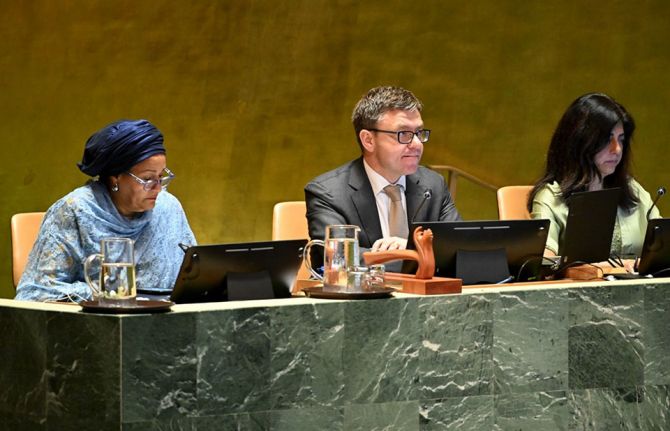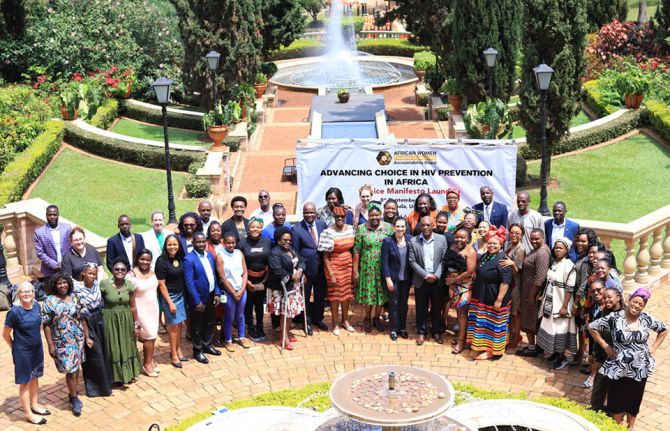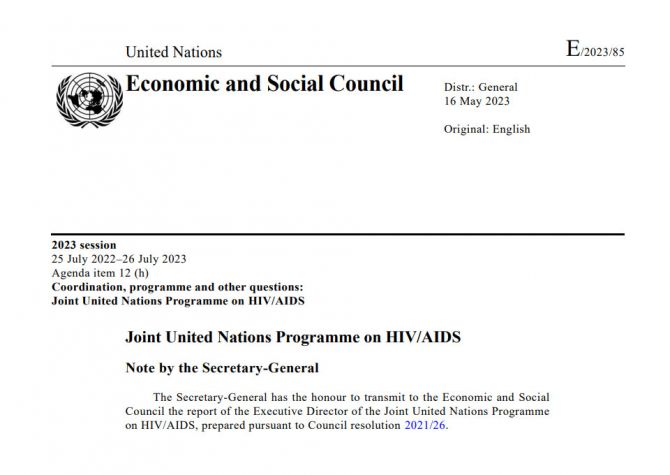
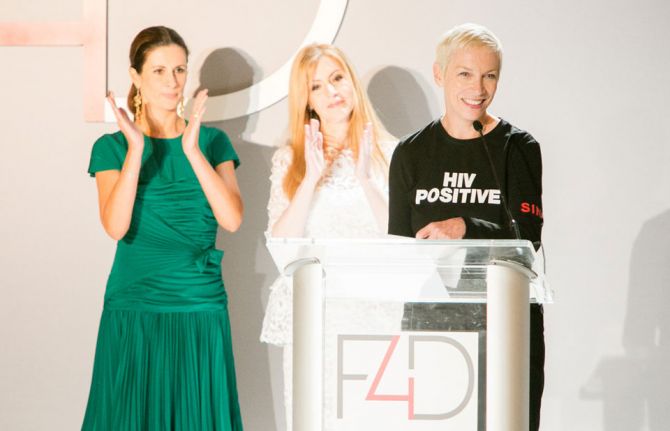
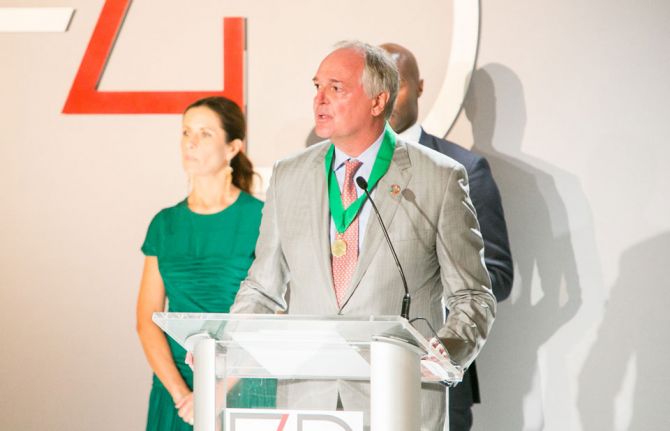
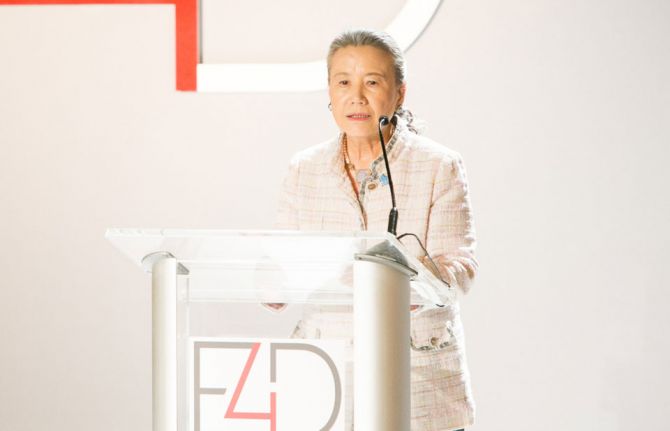
Update
UNAIDS International Goodwill Ambassador Annie Lennox awarded the 2016 Fashion 4 Development Award
22 September 2016
22 September 2016 22 September 2016UNAIDS International Goodwill Ambassador Annie Lennox received the Fashion 4 Development Award on 21 September in recognition of her outstanding work as a campaigner for women’s rights and HIV issues.
The award was made at the Fashion 4 Development’s Annual First Ladies Luncheon, which is held during the United Nations General Assembly week in New York, United States of America, to celebrate the unprecedented cooperation between diplomacy and fashion for the greater good of women and children worldwide.
Annie Lennox has been actively engaged in responding to HIV since 2003, when she first met Nelson Mandela and personally witnessed how the AIDS pandemic was affecting countries and communities.
After seeing how the epidemic disproportionally affects women and children, she has dedicated her efforts to help women empower other women. In 2008, Ms Lennox founded the Circle, a group of influential women who have come together to use their profiles, ideas, skills and resources to connect with women living in poverty around the world deprived of their human rights.
In her role as a UNAIDS Goodwill Ambassador, Annie Lennox has undertaken numerous high-profile speaking roles and field missions and has been a prominent voice for the implementation of the Global Plan towards the elimination of new HIV infections among children by 2015 and keeping their mothers alive, which has led to a reduction in new HIV infections among children globally.
Fashion 4 Development is a private sector global platform founded by Evie Evangelou in 2011 and supports the Sustainable Development Goals by promoting social change through harnessing the power of the fashion industry and facilitating platforms for exchange and engagement.
Quotes
“I am personally so grateful for all the opportunities I have been given, by the sacrifices of so many courageous women of past and present generations. That is why I am a passionate advocate for the rights of girls and women in the developing world.”
This award is very well-deserved and is testament to Annie Lennox's longstanding commitment to these issues. She is a powerful and passionate advocate who works tirelessly to empower women and girls. UNAIDS is proud that she is our Goodwill Ambassador.
Related

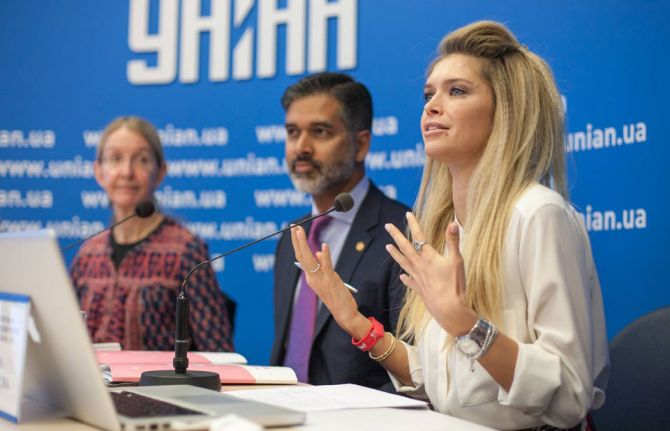
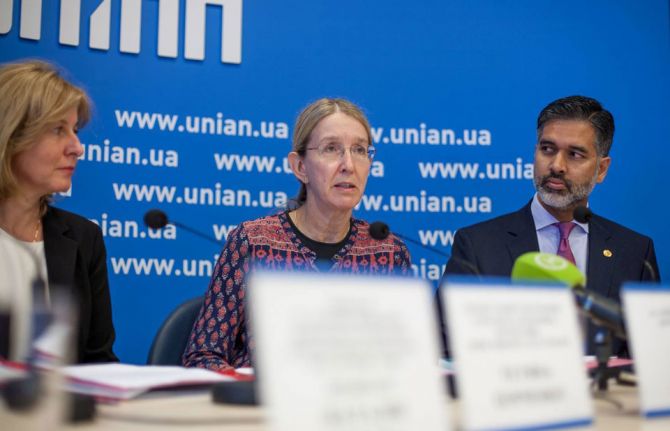

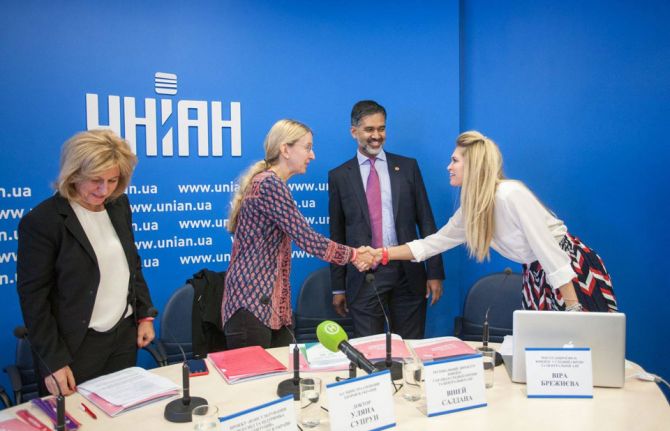
Update
HIV prevention campaign launched in Ukraine
21 September 2016
21 September 2016 21 September 2016The HIV prevention campaign Believe it or Not, featuring UNAIDS Goodwill Ambassador for Eastern Europe and Central Asia Vera Brezhneva as a spokesperson, was launched in Kyiv, Ukraine, on 15 September.
The national campaign encourages men and women to get the facts on HIV and to protect themselves and are invited to test their knowledge about HIV at viryuneviryu.com.
An online platform with key facts about HIV, HIV testing sites, an epidemiological review and other elements on HIV awareness is also available at http://www.helpme.com.ua/ua/main/. Posters, city lights and billboards will promote campaign messages across the country.
The number of new HIV infections is still growing in Ukraine. According to the latest national data, HIV sexual transmission is rising and accounts for up to 70% of new registered cases. The vast majority of the estimated 220 000 people living with HIV in the country in 2015 are 15–49 years old.
The Government of Ukraine, UNAIDS and the Deutsche Gesellschaft für Internationale Zusammenarbeit, acting on behalf of the Government of Germany, are working together on the campaign.
Quotes
“We are grateful to our international partners for their support with the HIV response in Ukraine and reforms in the health-care sector. This campaign is a good example of the way prevention campaigns for the general population should be implemented.”
“It is much easier to prevent HIV infection than to treat it. For our country, which is currently facing multiple challenges, it is vital to stop new HIV infections now.”
“We want to remind people about simple but very important things: don’t believe in words, only believe in facts about HIV infection. Don’t be scared to talk about your safety with sexual partners. Be responsible for your health and get tested for HIV regularly.”
“If we want to end the AIDS epidemic by 2030, we have to use all opportunities and innovative approaches to prevent new cases of HIV.”
“We welcome the collaboration with our partners and support Ukraine in the implementation of this campaign. We can only achieve visible results by uniting our efforts.”
Region/country
Related

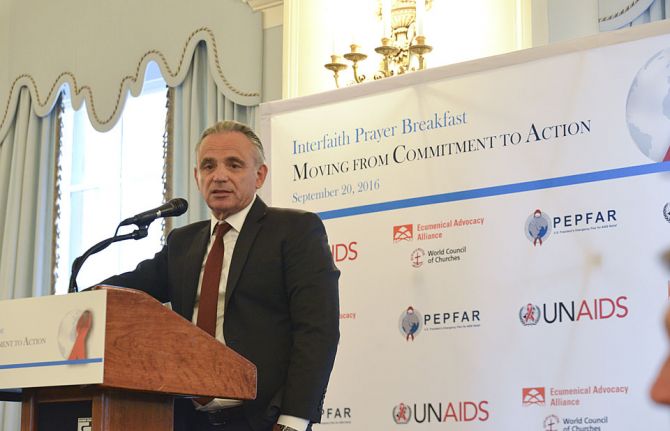
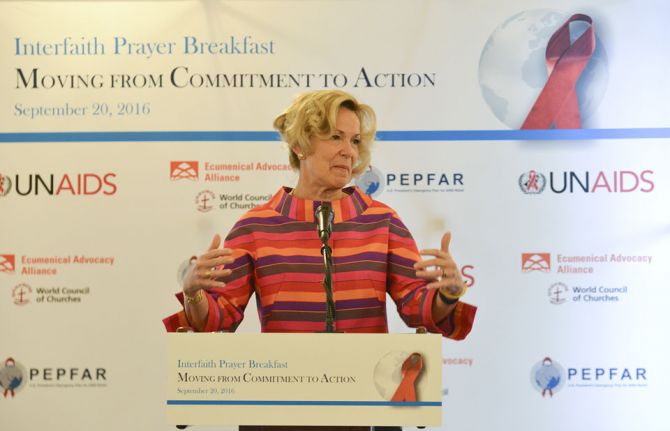
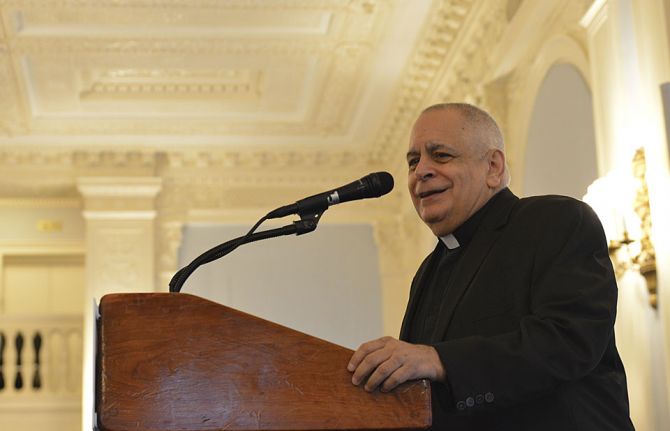
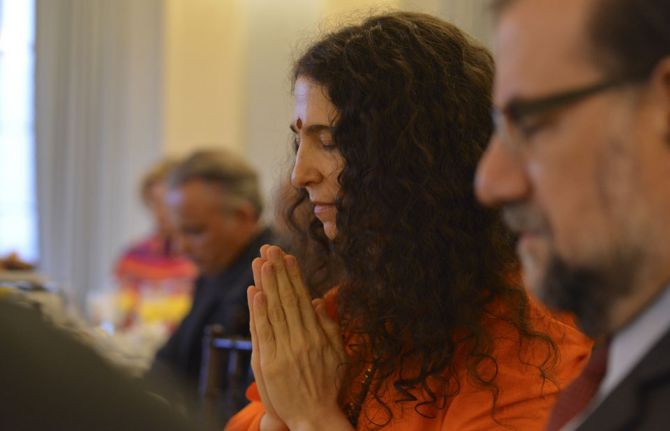
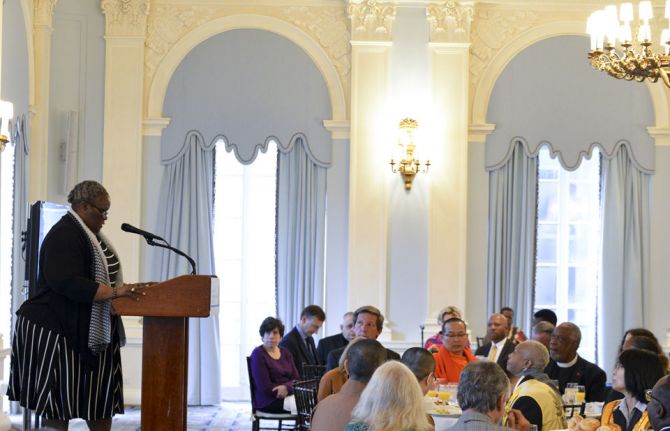
Update
A Fast-Track faith-based response to HIV
20 September 2016
20 September 2016 20 September 2016Faith-based organizations have played a critical role in responding to HIV since the start of the epidemic more than 35 years ago. Many faith-based organizations have been delivering effective, high-quality HIV services, complementing national public health programmes in the countries most affected by HIV. Their position of trust at the heart of communities allows faith-based organizations to provide services and support that extend beyond the reach of many public sector health systems.
The engagement of the faith community is paramount to achieving the UNAIDS Fast-Track Targets and the Sustainable Development Goal target of ending the AIDS epidemic by 2030. Countries, faith communities, and other partners recommitted to these targets during the June 2016 United Nations General Assembly High-Level Meeting on Ending AIDS in New York. Countries adopted a Political Declaration on Ending AIDS and the faith community issued a call to action to ensure that no one is left behind.
In the call to action, faith leaders pledged to take significant and sustained action during the next five years in four particular areas: reducing stigma and discrimination; increasing access to HIV services; defending human rights; and ensuring treatment for children. They called on all faith leaders to join them.
To provide an opportunity to strengthen relationships and forge new partnerships, the World Council of Churches–Ecumenical Advocacy Alliance, in collaboration with UNAIDS, the United States President’s Emergency Plan for AIDS Relief and the United Nations Interagency Task Force on Religion and Development, hosted an interfaith prayer breakfast on the sidelines of the 71st session of the United Nations General Assembly in New York.
Participants included faith leaders from a multitude of religions, all of whom agreed to support a coordinated faith-based effort in responding to HIV. The call to action issued in June was reiterated and wide-ranging discussions were held that resulted in a number of strong follow-up recommendations and commitments to action over the next five years to ensure a Fast-Track faith-based response to end the AIDS epidemic by 2030.
Quotes
"If there ever was a time to change words into action, it is today."
“Your commitment brings us hope. Your capacity needs to be strengthened, supported and fully incorporated into the global response to HIV.”
“The interfaith prayer breakfast is self-expressive of the forms of partnership the WCC seeks to promote and encourage between faith-based organizations and faith communities of all religious traditions, governments and the UN. The WCC seeks to model a strong, proactive, collaborative and compassionate response to HIV and AIDS and to move together from this commitment to action for the elimination of AIDS as a public health threat by 2013.”
“It is an exceptional time to build stronger connections between the UN and Faith Based Organizations.”
“At the end of the day our destiny is one and the same.”
“10% of life is what happens to us 90% is what we do about it. All of us need to be at the table if we want to overcome this epidemic.”
“Children cannot speak for themselves. They need us to speak for them.”
Related

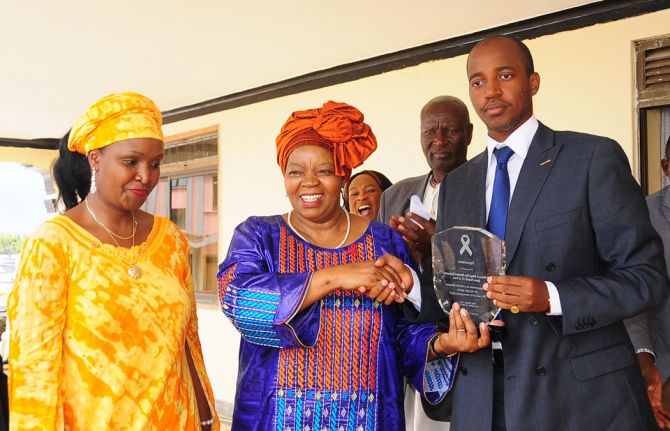
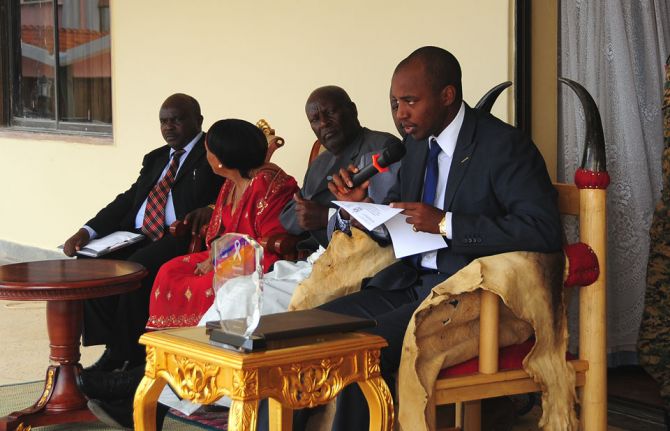
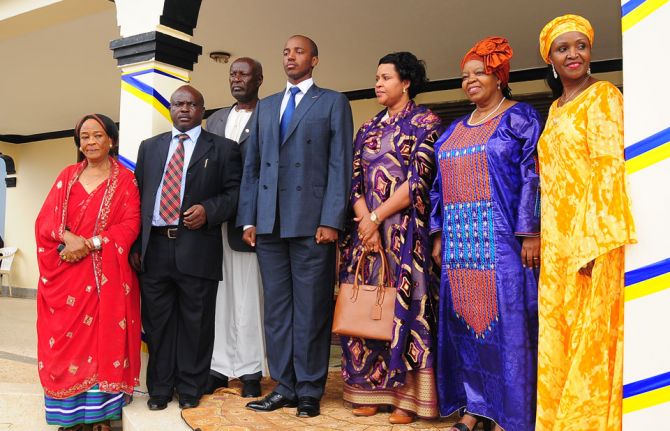
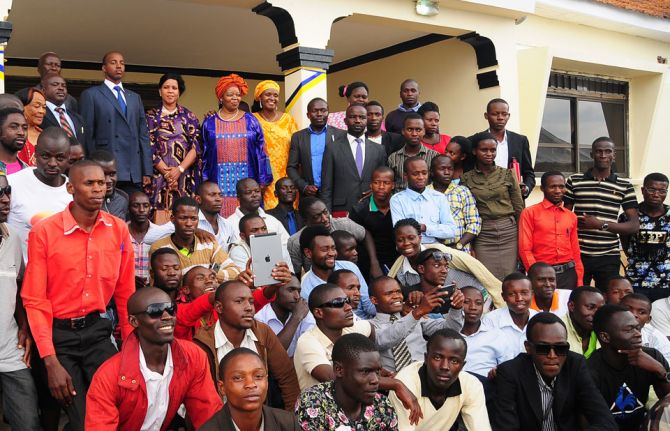
Update
King Oyo of Uganda committed to ending the AIDS epidemic among young people by 2030
20 September 2016
20 September 2016 20 September 2016King Oyo Nyimba Kabamba Iguru Rukiidi IV of the Tooro Kingdom in Uganda expressed his commitment to ending the AIDS epidemic as a public health threat by 2030 as he accepted the role of Cultural Champion for HIV and AIDS among Young People in Eastern and Southern Africa on 8 September. At 24, King Oyo is the youngest reigning monarch in the world and has significant influence and respect among young people in the eastern and southern Africa region.
Speaking in Fort Portal, Uganda, in the presence of the UNAIDS Regional Director for Eastern and Southern Africa, Sheila Tlou, King Oyo highlighted the need to eliminate new HIV infections in the kingdom. He emphasized that this should not be the role of women alone and called on men to support their partners, especially with regard to the prevention of mother-to-child transmission of HIV.
Uganda has made much progress in its HIV response. Prevention of mother-to-child transmission of HIV coverage is over 95%, which has led to a reduction in the number of babies born with HIV from approximately 28 000 in 2011 to 3400 in 2015. New HIV infections have also dropped by more than half, from 162 294 in 2011 to 83 000 in 2015. While there have been many successes, new HIV infections remain high. Uganda registers an estimated 33 new HIV infections per day among young people between the ages of 15 and 24 years and comprehensive knowledge of HIV, as well as uptake of HIV prevention and treatment services among young people, remains low. Thus, King Oyo’s new role is critical to addressing HIV prevention among young people.
Quotes
“No child should be born with HIV in Tooro and people that are tested and found to be HIV-positive should be placed on treatment.”
“If we are to end the AIDS epidemic as a public health threat by 2030, we have to engage cultural leaders, given the important role they play in society as custodians of culture. They are integral players in the AIDS response.”
Region/country
Related

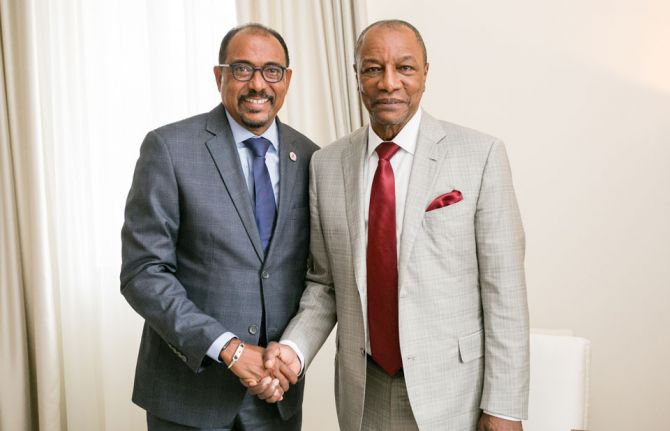
Update
UNAIDS Executive Director meets with President of Guinea, Alpha Condé
19 September 2016
19 September 2016 19 September 2016During his attendance at the 71st session of the United Nations General Assembly, UNAIDS Executive Director Michel Sidibé met with the President of Guinea, Alpha Condé, to discuss the AIDS response in Guinea and across the wider region of western and central Africa.
Their discussions focused on the need for a fully-funded AIDS response and concerns that the region is not making sufficient headway in reducing the impact of the AIDS epidemic.
Historically, western and central Africa has had lower levels of new HIV infections than other parts of the continent. However, new data are showing that while southern and eastern Africa has seen the number of new HIV infections decline, western and central Africa has not seen the same progress.
Mr Condé said he was fully supportive of the proposed adoption of an emergency plan for scaling up the AIDS response across the region.
Region/country
Related

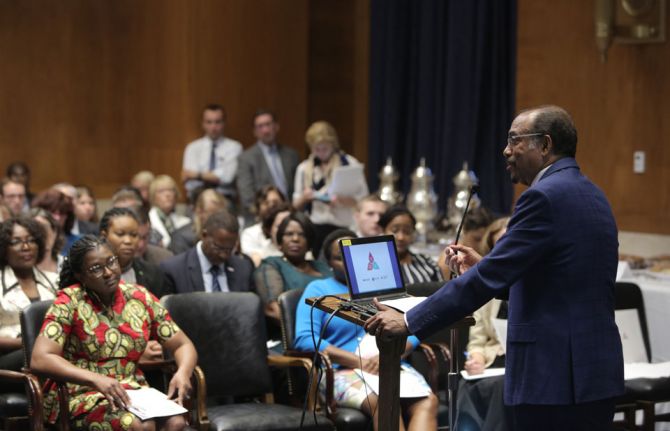
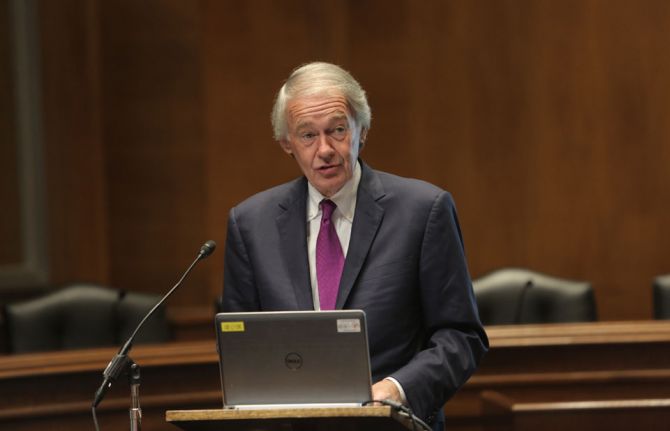
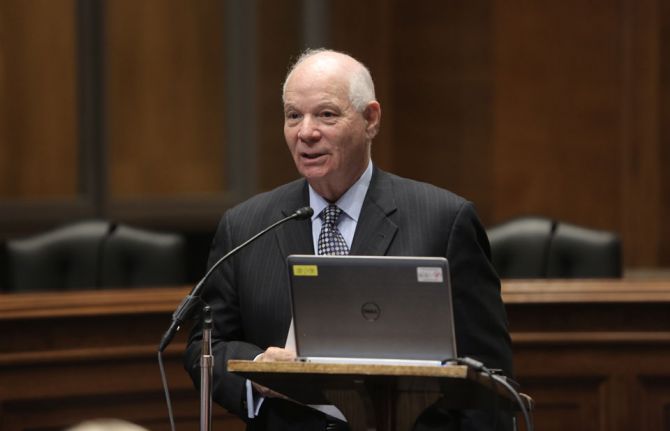
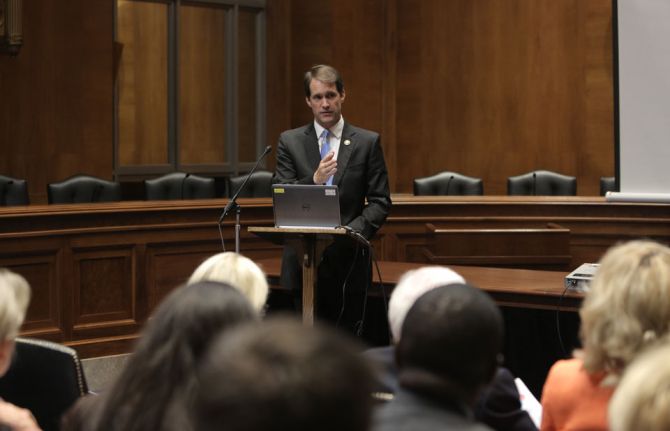
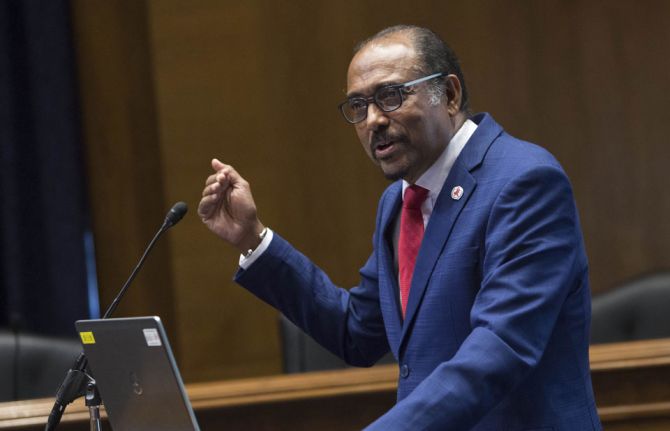
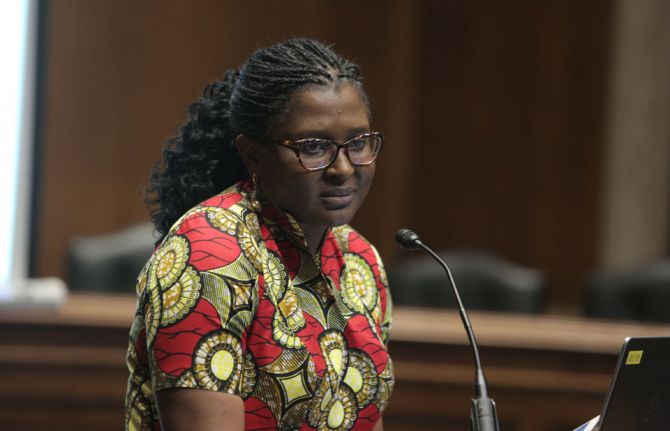
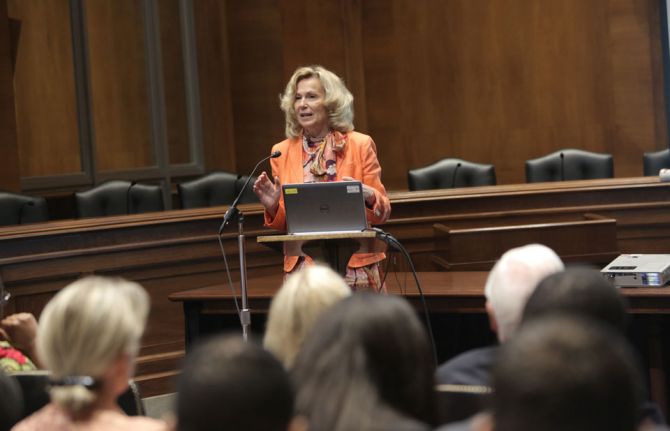
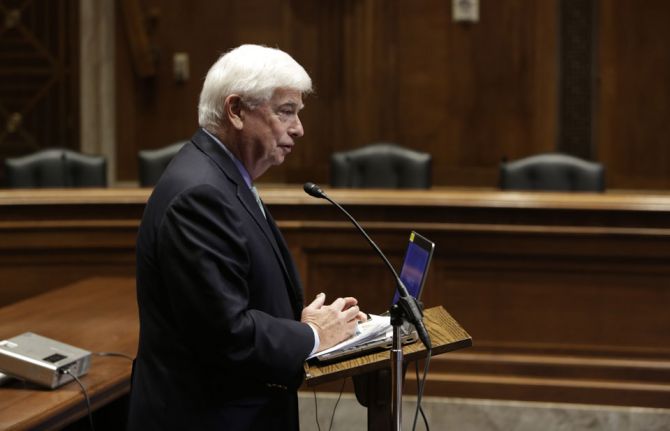
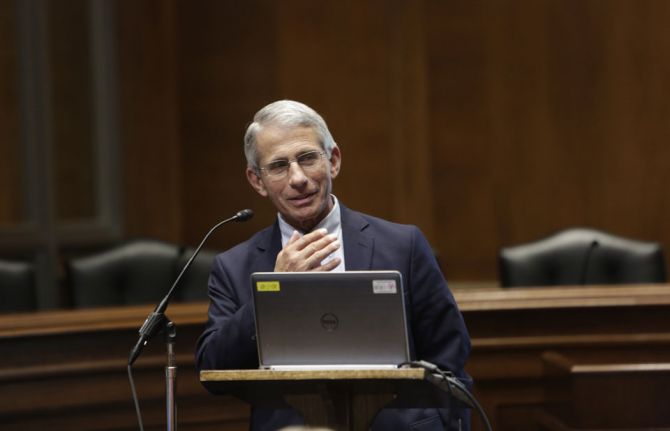
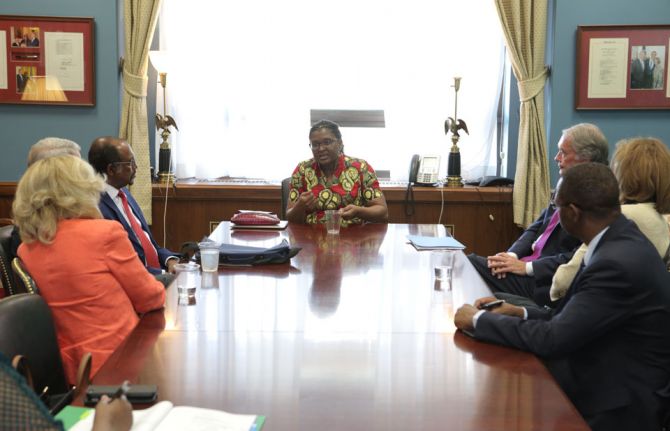

Update
Senior United States officials, members of Congress and partners recommit to ending AIDS among children, adolescents and young women
16 September 2016
16 September 2016 16 September 2016UNAIDS and the Elizabeth Glaser Pediatric AIDS Foundation hosted a high-level Congressional briefing in the United States Senate to increase momentum around an ambitious Super-Fast-Track framework—Start Free, Stay Free, AIDS Free. The initiative, which was launched by UNAIDS, the United States President’s Emergency Plan for AIDS Relief (PEPFAR) and partners in June 2016, outlines a set of time-bound targets to reach in order to stop new HIV infections among children, prevent new HIV infections among adolescents and young women and ensure access to antiretroviral treatment.
The Start Free, Stay Free, AIDS Free initiative builds on the progress made under the Global Plan towards the elimination of new HIV infections among children by 2015 and keeping their mothers alive (Global Plan). The Global Plan made a major contribution to a 60% reduction in new HIV infections among children since 2009 in the 21 countries in sub-Saharan Africa most affected by the epidemic. Speakers highlighted the need to keep up the momentum, warning that complacency could reverse the important gains that have been made.
Michel Sidibé, Executive Director of UNAIDS, brought attention to the need to increase access to treatment for children. He said that despite the treatment scale-up for children, which has grown twofold in the past five years and resulted in a 44% reduction in AIDS-related deaths among children, one in two children living with HIV still does not have access. Without immediate access to treatment, about 50% of children infected at birth will die by age 2.
Senators Edward Markey and Benjamin Cardin, honorary co-hosts of the briefing, and Congressman James Himes referred to the commitment of the American people through PEPFAR, and the important results that have been achieved through the strong partnerships with the countries most affected by the epidemic. Monica Geingos, First Lady of Namibia, expressed appreciation for the support of PEPFAR and UNAIDS in Namibia, and emphasized the need for continued engagement to address challenges related to HIV prevention, inequality and harmful gender norms. Namibia is a leader in the response to HIV and one of six countries—together with Botswana, Mozambique, South Africa, Swaziland and Uganda—that have reached 90% or more of pregnant women living with HIV with life-saving antiretroviral medicines.
Deborah Birx, United States Global AIDS Coordinator and Special Representative for Global Health Diplomacy, presented data illustrating dramatic recent achievements in stopping new HIV infections among children, and described evolving epidemic dynamics that demand new approaches so that the next phase of the response is successful in addressing the needs of the largest generation of young people the world has ever seen.
Director of the National Institute of Allergy and Infectious Diseases, Anthony Fauci, shared an overview of the science behind each pillar of Start Free, Stay Free, AIDS Free, showing that the world has the tools required to achieve the targets. Further innovations in treatment and prevention science hold the promise of accelerating the response by making commodities and services easier to access and use, and overall more effective.
Speaking in his capacity as a board member of the Elizabeth Glaser Pediatric AIDS Foundation, former Senator Christopher Dodd reflected on the bipartisan political commitment behind PEPFAR and the courage demonstrated by a number of elected officials at a time when AIDS was considered to be a difficult and controversial issue. He emphasized that this commitment must be constantly reinforced until the vision of an AIDS-free generation is achieved.
Quotes
“With Start Free, Stay Free, AIDS Free, we have the power to ensure in the future that no one is born with this disease. A future where those who are HIV-positive reach viral suppression. A future where no one dies of an AIDS-related illness. A future where there is no discrimination against those with the disease. A future where children will have to look to the history books to find that there ever was such a disease called AIDS.”
“AIDS was a death sentence not too long ago, but we have changed the landscape. We did that with the commitment of Congress in a bipartisan way through the United States President’s Emergency Plan for AIDS Relief, committing consequential resources targeted to the countries that would make a difference for the epidemic. We can take a moment to celebrate this morning, but by this afternoon it is back to work because we are not finished yet. Too many people are still suffering today. We want children to stay AIDS-free, and we know how to get that done.”
“We must make sure that we do not become the victims of our own success, because it is only partial success. The only thing that can stop us from our goal is complacency and distraction. Start Free, Stay Free, AIDS Free is one of those things that is going to allow us to finally put this disease in our rear-view mirror and in history where it belongs.”
“Progress is fragile and the worst conspiracy we have today is complacency. We have to reach the most marginalized with HIV services and change the social norms to break the cycle of violence and abuse that are making women and adolescent girls more vulnerable to HIV.”
“Poverty and inequality constitute a recognized cause and consequence of HIV. This correlation means that an HIV-free generation for us must be a generation that is free from poverty. It’s a generation that must be free from gender inequality. It’s a generation in which girls must have equal access to education. An HIV-free generation tomorrow requires our collective leadership today.”
“The challenge in many countries is how to build health care around wellness, the potential of primary care for everyone. Many young men and young women under 30 don’t know their HIV status. The lowest HIV testing rate is among men between the ages of 24 and 35. These are groups that we need to figure out how to reach—the 15- to 24-year-old adolescent girls and young women, those 24- to 35-year-old men who feel healthy and don’t believe they are sick. Find out how to connect them to testing for HIV when that is often the last thing they want to hear about. That is a task that we all have to achieve together.”
“If you follow the science, we will be able to change the epidemic as we know it now with an extraordinary decrease in the projections. And if we do that, we will be able to realize the goals of Start Free, Stay Free, AIDS Free.”
“We have made possible what was previously thought to be impossible—and today we celebrate that great success. But our work is not over. We must continue to work harder, and smarter, to get to what we know is achievable. And that is a world where no child has AIDS.”
Related
 “Who will protect our young people?”
“Who will protect our young people?”

02 June 2025

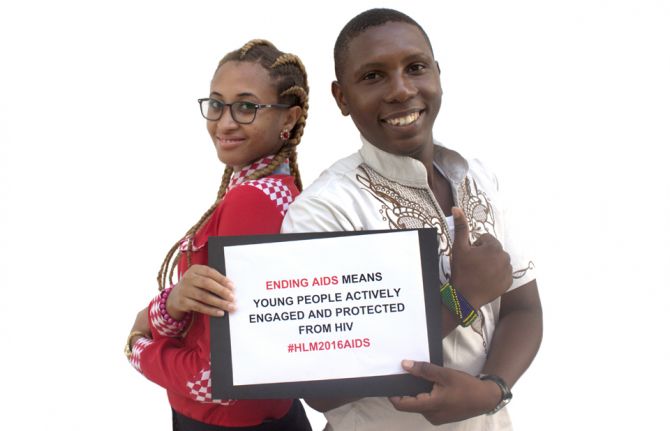
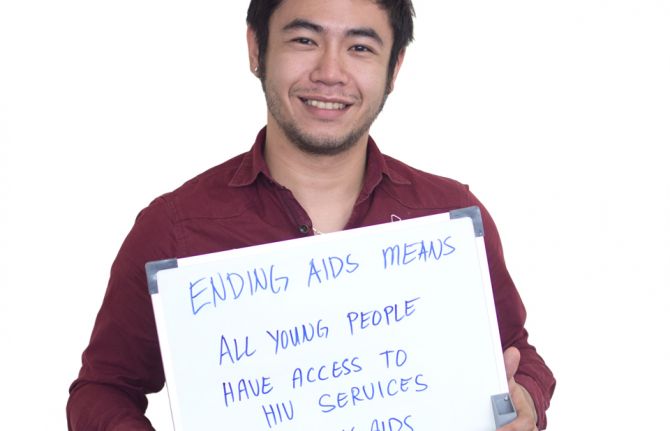
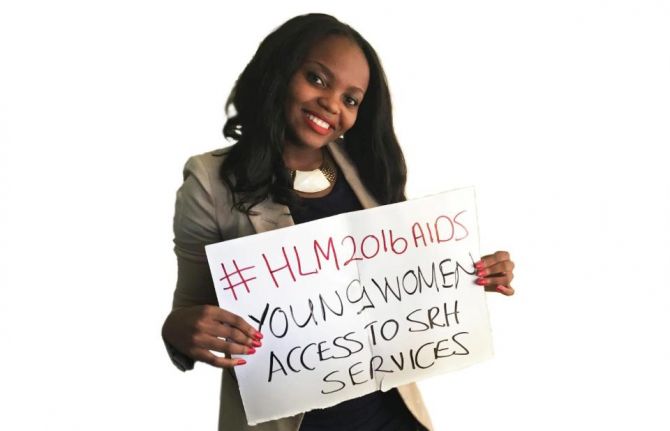
Update
Breaking down the barriers on international youth day – young people need better access to HIV services
12 August 2016
12 August 2016 12 August 2016National policies and practices continue to prevent young people (aged 10-24 years) from accessing the HIV, sexual and reproductive health and rights services that they need. On this International Youth Day, UNAIDS calls on national authorities, civil society organizations, youth activists and all stakeholders in the AIDS response to review and challenge national policies, such as those related to age of consent and spousal consent, which may cause young people to be left behind in the HIV response.
In 2015, about 1800 new HIV infections, and 150 AIDS-related deaths occurred every day among youth aged 15-24 years globally. Almost 4 million young people aged 15-24 are living with HIV, many of whom do not know their HIV status. Adolescents (10-19) are the only age group among whom AIDS-related deaths are increasing. Today, only 36% of young men and 30% of young women (ages 15-24) in sub-Saharan Africa have comprehensive and correct knowledge of how to prevent HIV infection.
Some countries continue to have age of consent policies that deter adolescents from accessing HIV testing and counselling services, without the consent of a parent or guardian. Spousal consent —the legal obligation for a woman or girl to ask permission from her husband to access a service— also hampers access to services for adolescent girls and young women. Adolescent girls and young women bear a disproportionate burden of new HIV infections among young people, 58% globally and 66% in sub-Saharan Africa in 2015. Twenty-seven countries require spousal consent for women to access any sexual and reproductive health service. Moreover, young key populations are frequently subjected to violence, stigma, discrimination and exclusion, and must be ensured a legal environment that respects, protects and promotes their human rights for any progress in the HIV response to be sustained.
UNDP supported a systematic desk review of age-of-consent laws and policies, as part of the All In partnership to engage, mobilize and support adolescents as leaders and agents of social change. The analysis, presented at the 2016 International AIDS Conference in Durban, South Africa recommends that: “at a minimum, countries should (i) specifically provide for age of consent laws that are non-contradictory and that reflect the evolving capacity, age and maturity of the adolescent; (ii) ensure that the age of consent applies to all adolescents, irrespective of sex, gender, sexual orientation or gender identity; and (iii) consider providing for an adolescent who has not reached the age set by law to provide consent based on an assessment of factors, such as the evolving capacity, age and maturity of the adolescent, the risk of HIV infection and the independence from or absence of parental or alternative care. For instance, the age of consent to HIV testing should not be higher than the age of consent to sex so that a sexually active adolescent should be able to consent to HIV testing. Furthermore, once an adolescent can consent to HIV testing, the adolescent should be able to independently consent to other HIV prevention, treatment and care services."
Building on this effort through the All In partnership, UNAIDS is supporting the development of an age of consent advocacy pack, for youth advocates, youth-led and youth serving organizations and networks vested in amending consent laws for the benefit of young people’s access to services. This advocacy pack is expected to be piloted in India and Zimbabwe in the following months.
Moreover, UNAIDS, in partnership with the International Planned Parenthood Federation (IPPF) and The PACT, are supporting youth alliances working on HIV and sexual and reproductive health and rights in Algeria, Bulgaria, India, Jamaica, Kenya, Mexico, Nigeria, Philippines, South Africa, Uganda, Zambia and Zimbabwe through the ACT!2015 youth-led social action initiative. ACT!2015 aims to strengthen young people’s evidence gathering and data analysis skills to facilitate advocacy and accountability around policies that limit young people’s access to services.
Quotes
“AIDS-related deaths are rising among only one population group and that is young people. We will fail to achieve the end of AIDS if national policies and practices continue to restrict young people's access to HIV, sexual and reproductive health services. We must tackle the determinants of HIV risk and vulnerability and facilitate the realization of young people’s rights so that they can achieve their full potential in life.”
“Bad laws fuel the spread of HIV, block effective responses to HIV and violate human rights. Through the All In platform, UNDP, UNAIDS and other UN organizations are invested in continuing our support to young people’s advocacy, and supporting countries to reform laws and policies that hamper young people’s access to services. Upholding young people’s rights is an integral part of a sustainable HIV response."
“The collective vision behind ACT!2015 is the fulfilment of young people’s sexual and reproductive rights everywhere, through strong partnerships and unwavering support to the national youth alliances in country. This project is so important because it centres around youth experiences and youth-led advocacy as a tool for policy change, targeting the barriers that restrict young people’s rights and impact on their sexual and reproductive health.”
“If policies become more friendly, young people will have healthier behaviours because they will not be afraid to access services."


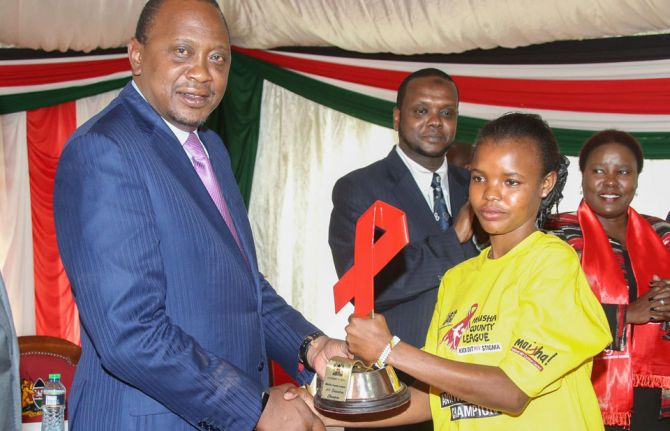
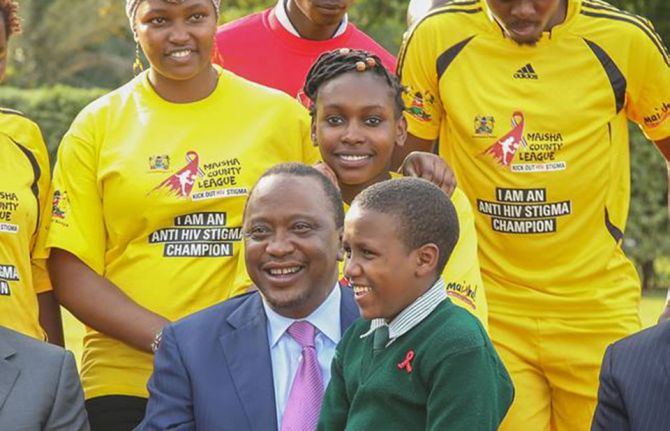
Update
Kenya reaffirms commitment to address stigma and discrimination
02 August 2016
02 August 2016 02 August 2016Kenya has reaffirmed its commitment to end HIV-related stigma and discrimination with a new national campaign titled “Kick out HIV stigma”. The campaign, which aims to engage the Kenyan youth through the Maisha County Football League, leverages the power of football to mobilize young people to end HIV stigma and link them to stigma-free HIV testing, treatment and care.
Championing the campaign, Uhuru Kenyatta, President of Kenya received the league’s trophies, which he will award to the winning teams on World AIDS Day 2016.
HIV is significant health threat among adolescents and young people in Kenya. As per 2015 estimates, a total of 35 776 new HIV infections and 3 853 AIDS-related deaths occurred among young people aged 15 to 24. HIV-related stigma remains a significant barrier to many young people accessing HIV counselling and testing, as well as lifesaving HIV treatment.
The “Kick out HIV stigma” campaign intends to reach 10 million young people in Kenya with HIV messages; provide mentorship to 3 million through an innovative digital platform and HIV counselling and testing—including immediate linkages to HIV treatment for those who test HIV positive—to 1 million by 1 December 2016.
The campaign is led by a partnership between government, the Football Kenya Federation, civil society, the United Nations and Kuza Biashara, a social enterprise on innovative information technology.
Quotes
“I am particularly confident of our capability to turn the tide on HIV because the Maisha County League provides us a unique opportunity to harness the power of sports for development.”
“No single entity, no single intervention can end HIV stigma, new HIV infections and AIDS. We must all work together.”
“I look forward to a day when all young people in Kenya will live in a stigma-free society.”
“Young people must have access to information, HIV testing and treatment free of stigma and discrimination. "
Region/country
Related

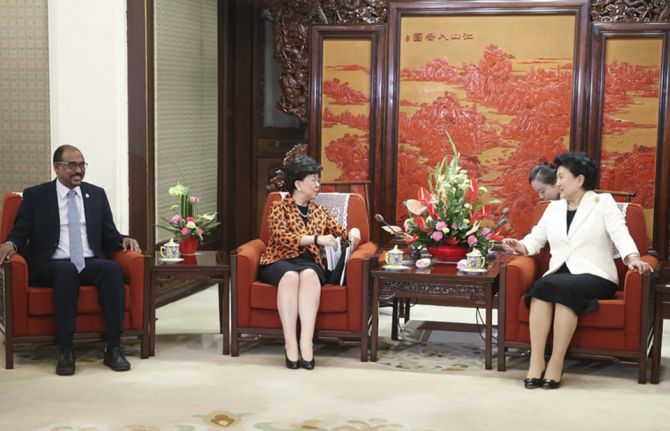

Update
Ensuring healthier outcomes for China and Africa
29 July 2016
29 July 2016 29 July 2016The Executive Director of UNAIDS, Michel Sidibé, and the Director-General of the World Health Organization, Margaret Chan, held wide ranging discussions with Vice-Premier of China, Liu Yandong in Beijing on 28 July.
The discussions touched on global and domestic health issues including China’s own health care reform programme and moves towards universal access to healthcare through the uptake of its medical insurance system. Mrs Liu underlined China’s commitment to improving health outcomes and welcomed the strength of the country’s partnerships with both UNAIDS and the World Health Organization.
Mr Sidibé congratulated the Chinese authorities for significantly reducing the number of AIDS-related deaths in the country and for expanding HIV prevention programmes nationwide to stop children from becoming infected with HIV. Since 2014, Beijing has reported that no babies have been born with HIV. Mr Sidibé also mentioned China’s highly successful harm reduction programmes, which continue to reduce the number of new HIV infections among people who inject drugs.
China’s contribution to the international AIDS response was also discussed, particularly the country’s support to some of the world’s most affected countries in Africa. The importance of building robust health systems and ensuring the local production of pharmaceuticals were both stressed as being key to the future response to the HIV epidemic in Africa.
Earlier in the week, Mr Sidibé met with the Vice-Chairman of the China-Africa Business Council, Xu Zhiming and thanked him for the organization’s ongoing support to the Organisation of African First Ladies Against HIV/AIDS. During his five-day visit, Mr Sidibé also met with Li Bin, the Minister for National Health and Family Planning, and discussed scaling up HIV prevention efforts among men who have sex with men and other key populations.
Quotes
“We must take the broadest approach towards health—by integrating health within social and economic development. People’s health is connected with economic development and the World Health Organization and UNAIDS have key roles to play.”
“When China makes health, integration and inclusion a priority, we can see there is a growing momentum to expand opportunities for knowledge sharing and capacity building with partners in Africa.”
“The World Health Organization and UNAIDS are good partners and will continue to support China’s efforts for health and its integration across the Sustainable Development agenda.”
Region/country

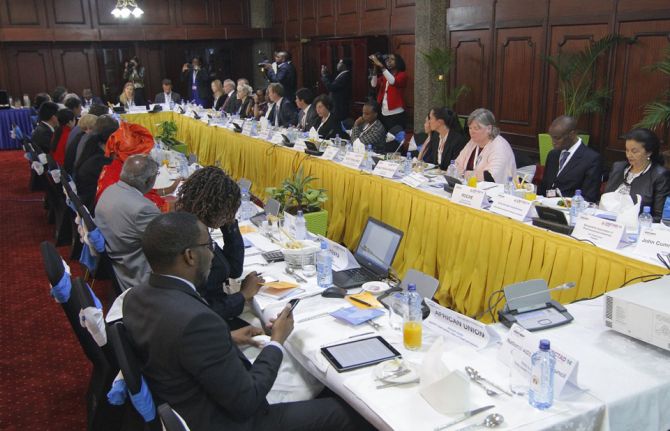
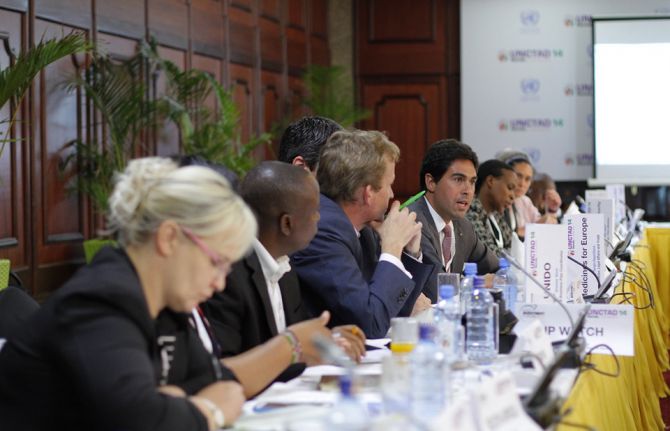
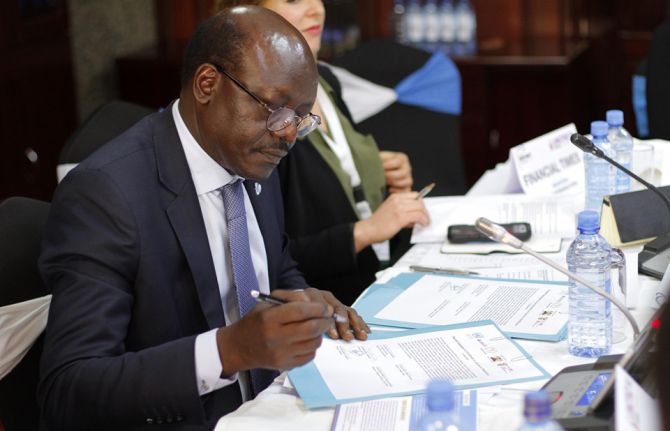
Update
Opportunities to expand local production of pharmaceutical products in Africa
25 July 2016
25 July 2016 25 July 2016Leaders of private sector organizations, investors, civil society and United Nations representatives met in Nairobi, Kenya, during the World Investment Forum 2016 to discuss business opportunities for expanding local production of pharmaceutical products in Africa and beyond. The event was part of efforts to support the Sustainable Development Goals (SDGs) and particularly to improve access to testing and treatment for HIV, TB and other health conditions.
UNAIDS and UNCTAD with support from the German Federal Ministry for Economic Cooperation and Development (BMZ) held a roundtable discussion where participants highlighted the challenges facing African local pharmaceutical producers including how to meet requirements related to the quality, safety and efficacy of medicines and good manufacturing practices. The need for foreign investment and government support was underscored as essential to the promotion of local production of quality medicines and the transfer of technologies and know-how.
During the session the African Union Commissioner for Trade and Industry Fatima Haram Acyl, Kenyan Cabinet Secretary (Minister of Health) Cleopa Mailu, South African Trade and Industry Minister Rob Davies, UNCTAD Secretary-General Mukhisa Kituyi and UNAIDS Executive Director Michel Sidibé signed the Nairobi Statement on Investment in Access to Medicines which highlights the importance of African domestic policies on health, investment, trade, technology and intellectual property, as well as the integration of markets.
In a statement delivered at the meeting, Mr Sidibé underscored the importance of access to medicines and the need for domestic solutions on the African continent. Mr Kituyi noted that pharmaceutical investment was particularly sensitive due to its impact on public health and stressed the need for concerted effort and political will. According to Mr Mailu many national pharmaceutical markets in Africa are relatively small on their own and that, without international support and in the face of competition from low-priced generic products, local manufacturing would continue to struggle. Mrs Acyl highlighted the need to accelerate implementation of the Pharmaceutical Manufacturing Plan for Africa, which was adopted by the Heads of State and Government of the African Union.
UNCTAD Director of Investment and Enterprise, James Zhan, discussed the importance of policy coherence, building local manufacturing capacities through investment, and developing multilateral cooperation to strengthen the pharmaceutical sector. Mr Zhan stressed that investment facilitation could not be promoted in isolation from a country's overall development goals.
The event brought together senior figures in health, development, investment and pharmaceuticals, to explore practical issues around access to finance, challenges for local producers, what investors need and look for, and examples of successful operations. The event was attended by pharmaceutical manufacturers from Bangladesh, Germany, India, Thailand and West Africa and trade and investment representatives from Belgium, China, Germany, Kenya, Switzerland and Uganda.
Quotes
"To achieve the Sustainable Development Goals, including ending the AIDS epidemic as a public health threat by 2030, African countries need to secure sustained access to affordable, quality-assured medicines and other health commodities. This is a health and development priority."
“Local production is essential for improved access to affordable medical products, and therefore to ensure a strong linkage between local production and improved access, there is need to bring coherence between health, industrial development and trade policies in the pharmaceutical sector.”
“Dialogue between Ministers of Trade and Ministers of Health is critical to advance the local production agenda. South Africa has the largest market for pharmaceuticals on the continent, with a total value of US$ 4 billion, but it also faces the biggest challenges and has the largest programme for provision of antiretrovirals.”
“We need to produce our own generic medicines for our people. While substantive progress is being made in the health, trade, investment and intellectual property sectors individually, a significant degree of coherence across these sectors is essential for the continent to reap maximum benefits of a viable pharmaceutical sector.”

